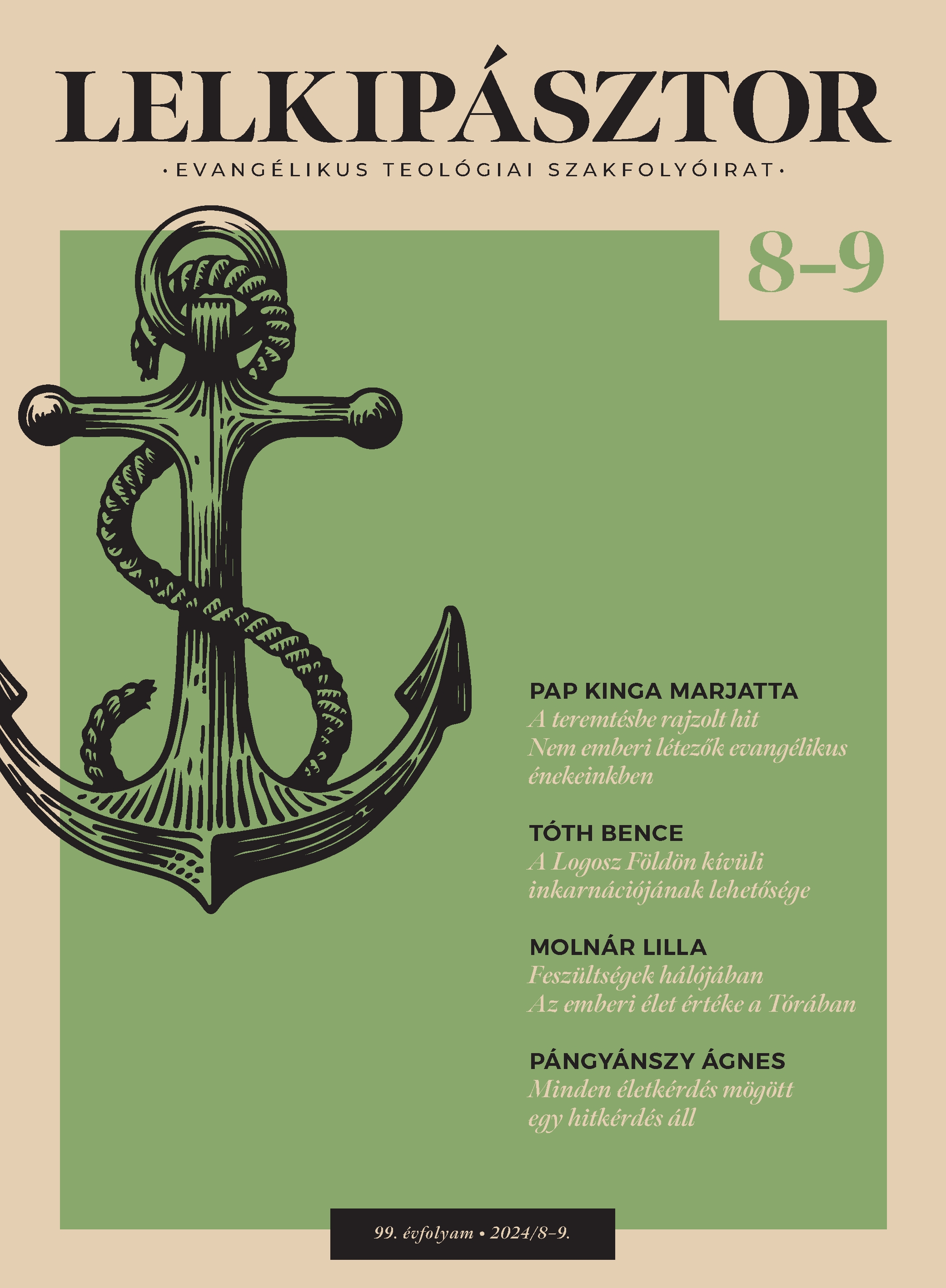In the Midst of Tensions
The Value of Human Life in the Torah
Abstract
Az alábbi tanulmány az emberi élet értékének exegetikai vizsgálatáról szóló doktori értekezés egy része, amely megalapozza az emberölés kérdésének megközelítését azzal, hogy egymás mellé helyez a gyilkosság eseményének előzményeihez és következményeihez kapcsolódó tórabeli igeszakaszokat. Ez az egymás mellé helyezés kiábrázolja a feszültségeket az előzmények és következmények oldalán is a narratívák és törvényszövegek közt, ugyanakkor gyújtópontba állítja és reflexióra hívja az emberi élet értékéről és az élet elvételéről való gondolkodást. Ennek elengedhetetlen része a vonatkozó szövegek hátterének, az azokat konstruáló hagyományoknak a vizsgálata.
References
Rövidítések
BDB = Brown, Francis – Driver, S. R. – Briggs, Charles 2010. The Brown–Driver–Briggs Hebrew and English Lexicon. With an appendix containing the Biblical Aramaic. Hendrickson Publishers, Peabody.
Ges18 = Gesenius, Wilhelm 1987–2009. Hebräisches und Aramäisches Handwörterbuch über das Alte Testament. 18. kiad. 1–5. köt. Springer-Verlag, Berlin–Heidelberg. https://doi.org/10.1007/978-3-642-61713-3_1
HALAT = Koehler, Ludwig – Baumgartner, Walter (szerk.) 1967–1995. Hebräisches und Arameäisches Lexikon zum Alten Testament. 1–5. köt. Brill, Leiden.
Felhasznált irodalom
Assmann, Jan 2003. Mózes, az egyiptomi. Ford. Ábrahám Zoltán – Görföl Tibor – Gulyás András – Tóth Péter. Osiris, Busapest, 2003.
Bainton, Roland H. 1990. Christian Attitudes Toward War and Peace. A Historical Survey and a Critical Re-evaluation. Abingdon Press, Nashville, 1990.
Barmash, Pamela 2005. Homicide in the Biblical World. Cambridge University Press, Cambridge. https://doi.org/10.1017/CBO9780511614170
Berquist, Jon L. 1996. Postcolonialism and Imperial Motives for Canonization. Semeia, 75. évf. 15–35. o.
Campbell, Antony F. – O’Brien, Mark A. 2000. Unfolding the Deuteronomistic History. Origins, Upgrades, Present Text. Fortress Press, Minneapolis.
Collins, John J. 2003. The Zeal of Phinehas. The Bible and the Legitimation of Violence. Journal of Biblical Literature, 122. évf. 1. sz. 3–21. o. https://doi.org/10.2307/3268089
Greenspahn, Frederick E. 1994. When Brothers Dwell Together. The Preeminence of Younger Siblings in the Hebrew Bible. Oxford University Press, New York. https://doi.org/10.1093/oso/9780195082531.001.0001
Hausmann, Jutta 2006. Ennyire kegyetlen az Isten? Megjegyzések az ószövetségi átok-fogalomhoz. Ókor, V. évf. 3–4. sz. 96–99. o.
Hofreiter, Christian 2018. Making Sense of the Old Testament Genocide. Christian Interpretations of Herem Passages. Oxford University Press, Oxford. (Oxford Theology and Religion Monographs.) https://doi.org/10.1093/oso/9780198810902.001.0001
Kang, Sa-Moon 1989. Divine War in the Old Testament and in the Ancient Near East. Walter de Gruyter, Berlin. https://doi.org/10.1515/9783110884920
Karasszon István 2009. Izrael története. A kezdetektől Bar-Kochbáig. Új Mandátum Kiadó, Budapest. (Kréné 10.)
Kessler, Rainer 2011. Az ókori Izrael társadalma. Történeti bevezetés. Ford. Szabó Csaba. Kálvin Kiadó, Budapest.
Lohr, Joel N. 2009. Righteous Abel, Wicked Cain. Genesis 4:1-16 in the Masoretic Text, the Septuagint, and the New Testament. The Catholic Biblical Quarterly, 71. évf. 3. sz. 485–496. o.
Lyons, William L. 2010. History of Modern Scholarship on the Biblical Word Ḥerem. The Contributions of Walter C. Kaiser, Jr., Peter C. Craigie, and Tremper Longman, III. Edwin Mellen Press, Lewiston.
Mathys, Hans-Peter 1986. Liebe deinen Nächsten wie dich selbst. Untersuchungen zum alttestamentlichen Gebot der Nächstenliebe (Lev 19,18). Universitätsverlag Freiburg Schweiz – Vandenhoeck & Ruprecht, Göttingen. (OBO 71.)
Millard, Alan R. 1983. The Old Testament and History. Some Considerations. Faith &Thought, 110. évf. 1–2. sz. 34–53. o.
Nauta, Rein 2009. Cain and Abel. Violence, Shame and Jealousy. Pastoral Psychology, 58. évf. 65–71. o. https://doi.org/10.1007/s11089-008-0146-x
Niditch, Susan 1993. War in the Hebrew Bible. A Study in the Ethics of Violence. Oxford University Press, New York. https://doi.org/10.1093/oso/9780195076387.001.0001
Pui-lan, Kwok 2005. Postcolonial Imagination and Feminist Theology. Westminster John Knox Press, Louisville.
Rad, Gerhard von 2007. Az Ószövetség teológiája. 1. köt. Ford. Görföl Tibor. Osiris, Budapest.
Stern, Philip D. 1991. The Biblical Ḥerem. A Window on Israel’s Religious Experience. Scholars Press, Atlanta. (Brown Judaic Studies 211.) https://doi.org/10.26300/70j7-vm42
Tóth J. Zoltán 2020. A halálbüntetés visszaállítására való törekvés Magyarországon. Glossa Iuridica, VII. évf. 1–2. sz. 21–29. o. Web: https://ajk.kre.hu/images/doc2021/glossa/2020VII12/toth_j_zoltan_a_halalbuntetes_visszaallitasara_valo_torekves_magyarorszagon.pdf. (Megtekintés: 2023. május 18.)
Vermeulen, Karolien 2014. Mind the Gap. Ambiguity in the Story of Cain and Abel. Journal of Biblical Literature, 133. évf. 1. sz. 29–42. o. https://doi.org/10.15699/jbibllite.133.1.29
Waltke, Bruce K. 1986. Cain and His Offering. Westminster Theological Journal, 48. évf. 363–372. o.

This work is licensed under a Creative Commons Attribution-NonCommercial-NoDerivatives 4.0 International License.




